Library
All resources
1621 – 1640 of 2424 results

Partnering with FSPs to Deliver Cash in Nepal: Top Considerations
Guidelines and Tools
Cash transfers are a proven way to help disaster-affected communities flexibly meet urgent basic needs. Several humanitarian agencies are planning cash transfers to support tens of thousands of Nepali earthquake survivors. While initial responses will likely rely on direct cash in envelopes, cash...

Revised Pre-Crisis Market Analysis (PCMA)
Guidelines and Tools
The purpose of this guidance is to provide field practitioners, across the different sectors, with a practical step-by-step process of how to plan, carry out, and update pre-crisis market mapping and analysis, leading to response/programme design and implementation as well as surveillance, early...

Giving Better: Lessons from Cash Grants for Syrian Refugees in Lebanon
Report
Cash grants to the poor have proven to be an effective form of aid for reducing poverty. Direct cash assistance is inexpensive to administer and allows recipients to buy what they want and need, rather than what experts think they need. Recent research shows that cash grants also work well for assisting...
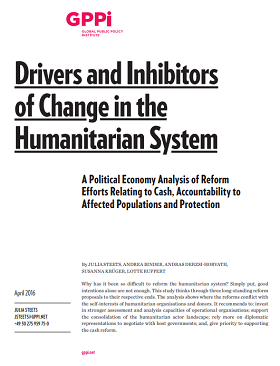
Drivers and Inhibitors of Change in the Humanitarian System
Report
This study analyses the drivers and inhibitors of change in the humanitarian system. It focuses on three reform efforts: cash-based emergency response, accountability to affected populations and protection. For each area, the study explores four questions to help explain why reforms are successful or...

Cash transfer resilience tool
Guidelines and Tools
The objective of this tool is to help humanitarian agencies at the country level better prepare for emergency response using cash transfers. This tool aims to guide humanitarian organizations to preposition cash transfer services and implement partnership (framework) agreements with FSPs by...

Working Paper 3: Shock-Responsive Social Protection in the Sahel: Community Perspectives
Report
This is the third in a series of working papers from the ongoing Shock-Responsive Social Protection Systems research. Together, the set of papers explore perspectives about the interface between social protection, humanitarian assistance and disaster risk management (DRM), to complement the formal...

Cash-based programming to address hunger in conflict-affected South Sudan: A case study
Report
For some time aid agencies and donors have recognised the benefits of utilising markets to deliver food assistance. And for almost as long, cash-based programming has been effective in doing this by improving people’s ability to purchase sufficient nutritious food. Addressing hunger through cash...

Cash Transfers in Humanitarian Contexts
Report
Upon request of the Inter-Agency Standing Committee (IASC) Principals at their meeting on December 11, 2015, the World Bank agreed to coordinate a process of reviewing key issues and options for significantly scaling up the use of multipurpose cash transfers (MPCTs; including digital cash and vouchers) in...

The Politics of Cash: A Case Study on Humanitarian Cash Transfers in Ukraine
Report
This case study examines the evolution of cash transfers in the humanitarian response in Ukraine. The use of cash transfers in Ukraine brought out the best and worst aspects of the international humanitarian system. Uncertainty over where cash fits into the humanitarian architecture – and whether...
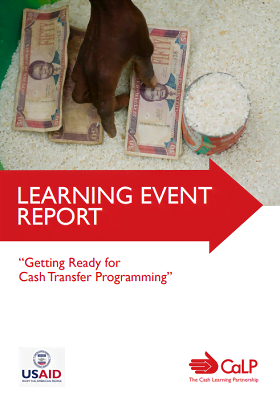
Learning Event Report " Getting ready for cash transfer programming"
Report
Despite the rapid, dynamic evolution of cash transfer implementation in West Africa, actors’ lack of preparation means that the tool cannot fulfil its potential. As a result, the scope of interventions remains limited, the combination of different methods is not often envisaged, the most...
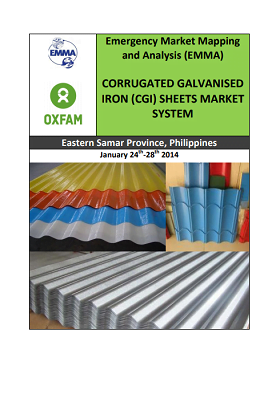
EMMA on CGI Sheets in Eastern Samar, Philippines
Report
Super Typhoon Haiyan (locally known as Yolanda) made landfall on the 8th of Nov’13 and left a trail of destruction along its path. It is estimated that 14 million people were affected and 4.1 million were displaced in the Philippines as a result of this super typhoon.Eastern Samar province of the...

Economic Impacts of Humanitarian Aid
Report
Humanitarian aid – whether in-kind or cash transfers – can have a significant economic impact. Potential positive effects include stimulating demand, supporting regeneration of local businesses, job creation and increased tax revenue for governments. Potential negative effects include price inflation,...
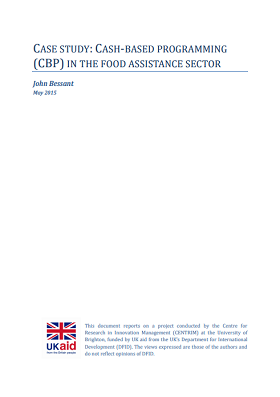
Case Study:Cash-based programming in the food assistance sector
Report
The purpose of this case study is to explore the pattern of innovation in the food supply and distribution area (i.e. not concerned with nutrition). The case raises some key policy issues: How to foster entrepreneurship and create enabling conditions for small-scale experiments and prototypes? How can...
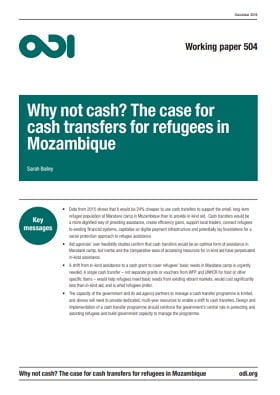
Why not cash? The case for cash transfers for refugees in Mozambique
Report
There are two areas where cash transfers could play a role in humanitarian assistance in Mozambique: in response to natural disasters and in support of the long-term refugee population. This working paper focuses on refugees. Why not cash? The case for cash transfers for refugees in Mozambique is one of a...
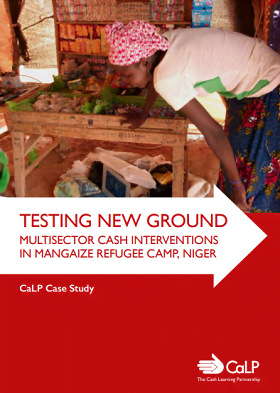
Testing new ground. Multisector cash interventions in Mangaize refugee camp Niger
Report
In the midst of the Mali refugee crisis in Niger, UNHCR implemented one of the first multisector cash transfer projects in Mangaize refugee camp in 2015, providing refugees with grants covering non-food items, hygiene, shelter and livelihood needs. The cash project came on the heels of a successful food...

Impact Evaluation of the Multipurpose Cash Assistance Programme
Report
The Syrian crisis is currently in its sixth year, with over one million Syrians still living in Lebanon as refugees. Nearly 60% of all financial resources pledged by UN agencies and INGOs were to secure basic assistance for Syrian refugees, mainly to support them in meeting food and healthcare needs. In...

Scaling Up Humanitarian Cash Transfers in Nepal
Case Study
The Nepal earthquake has a number of lessons for the global debates on scaling up cash both at the level of cash responses themselves and in the more transformational way envisaged by the High Level Panel through which cash can disrupt the established humanitarian system. Humanitarian cash transfers after...
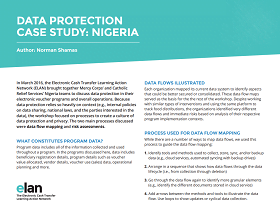
Data Protection Case Study: Nigeria
Report
In March 2016, the Electronic Cash Transfer Learning Action Network (ELAN) brought together Mercy Corps’ and Catholic Relief Services’ Nigeria teams to discuss data protection in their electronic voucher programs and overall operations. Because data protection relies so heaviliy on context (e.g.,...

Pre-Crisis Market Analysis: Credit, Drinking Water and Wheat Flour Market Systems
Report
Mosul, Iraq’s second largest city, was captured by ISIS in June 2014 and remains under their control. The Iraqi army has vowed to recapture Mosul and the speculation is that a counter-offensive is imminent – a military operation which could have dramatic humanitarian implications. A large influx of...

Baseline Assessment for Education Cash Transfer Programming for IDPS in Dahuk Governance
Report
REACH, in collaboration with UNICEF, conducted a Baseline Assessment of Access to Education among Internally Displaced Persons in the Dahuk Governorate of Iraq. This assessment aimed to improve the efficiency of humanitarian cash assistance by implementing partners for increased access to education in the...